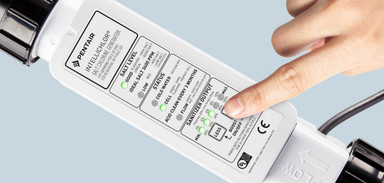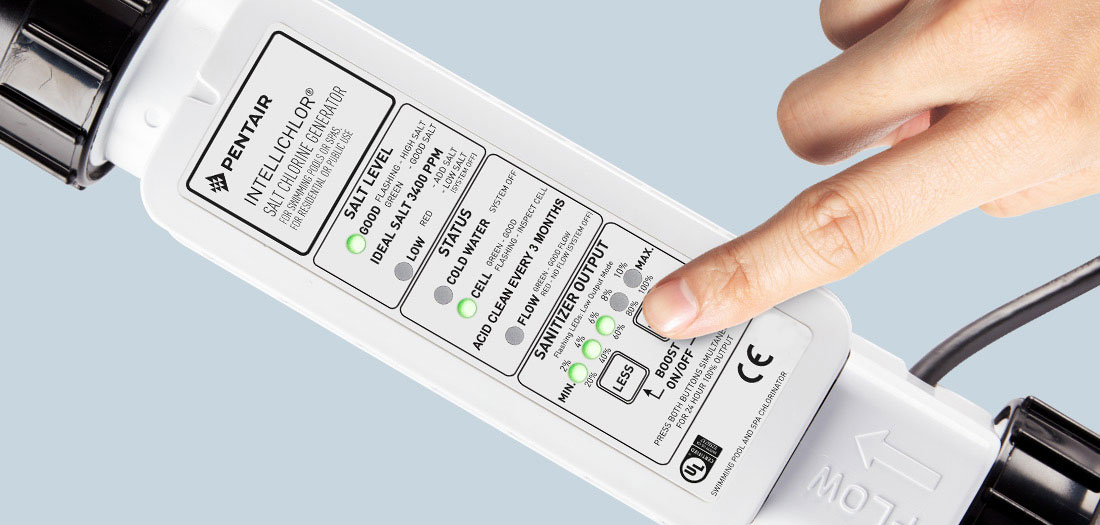Published by Matt Fichera on 02/07/2020
When Should I Replace My Pool's Salt Cell?
Salt systems convert normal table salt into pure chlorine and are becoming more and more common in pools. It is very easy to see why, once you understand that a reasonable up-front investment can relieve you of the time spent hauling chlorine and always worrying about what the sanitization status of the pool is.
As with most innovations, there is a need to become familiarized with the components of the salt system including the power center and the salt cell itself. It’s not unusual, especially for new salt system users to not be sure how to react when they notice a problem. Luckily, we have you covered with some info on salt cells.
Salt chlorine generators have a salt cell that can last anywhere from 3 to 5 years (10,000 hours of life) depending on its use. You should definitely check with the product manufacturer for the life expectancy. Most of these salt generators come with a control panel or a system to regulate the salt flow. These systems usually can tell you when the cell needs to be cleaned or replaced. Even though most units do have a way to let you know, it is still a good practice to get into checking the inside of your salt cell to make sure there isn’t buildup on metal components.
A few key signs to look for that would indicate it is time to replace your cell:
- Soapy discharge forming inside the cell that’s blue or green
- Buildup of mineral salt deposits and scale that’s noticeable
- Unbalanced water that can be tied directly to a drop in chlorine level
Any of these symptoms should first warrant a complete cleaning of the cell and if that doesn’t resolve the issue a replacement would be the next step. To avoid any issues that turn into down-time for the cell, and possibly for the pool, you should inspect your system regularly. It’s recommended that you inspect weekly during heavy use and at least bi-weekly/monthly during seasons where you don’t use it as much or not at all. What you are trying to avoid is a buildup that can overload and damage the cell or the power supply.
There are also many other factors to consider that could be the root cause of any recent trouble. These problems include the following:
- Pool chlorine could be decreased due to harsh sunlight and low levels of cyanuric acid (pool stabilizer) in the water.
- Normal flow of chlorine could be disrupted because the pool filter is not running correctly either mechanically or time wise.
- Simple water temperature increases could speed up the evaporation of chemicals including chlorine. This may apply more to certain geographic areas.
- Unusually low pH leading to acidic water
- An unusually high phosphate level in the water (typically more than 100 ppm) could be reducing chlorine.
There are other signs and symptoms which could be tied to issues with the salt cell. These include:
- Check salt light on the power center indicates a problem but the water sample shows nothing wrong
- The power center’s “check salt” light comes on indicating a problem, turns off after a thorough cleaning but comes back on soon afterward.
- Higher than normal voltage and low amperage (all of the way down to zero) will also result in irregular readings.
Last but not least, when diagnosing issues, it is important to focus on the cause of the chlorination problems and not the effect. The first place to look would be any diagnostic tools within the power center but also testing the pool water over the course of several days to gauge what is actually happening. Adding additional chemicals likely is only going to mask the problem which could in fact be a cell that needs cleaning, a faulty cell, or keep in mind that the problem could also be completely unrelated to your salt system. The first place to go for answers may in fact be your user manual. If there’s no answers there, most companies have additional resources on their website. The team at E-Z Test Pool Supplies also would be happy to assist you in troubleshooting and answering any questions you may have regarding salt cells and salt systems overall. Contact us here.







